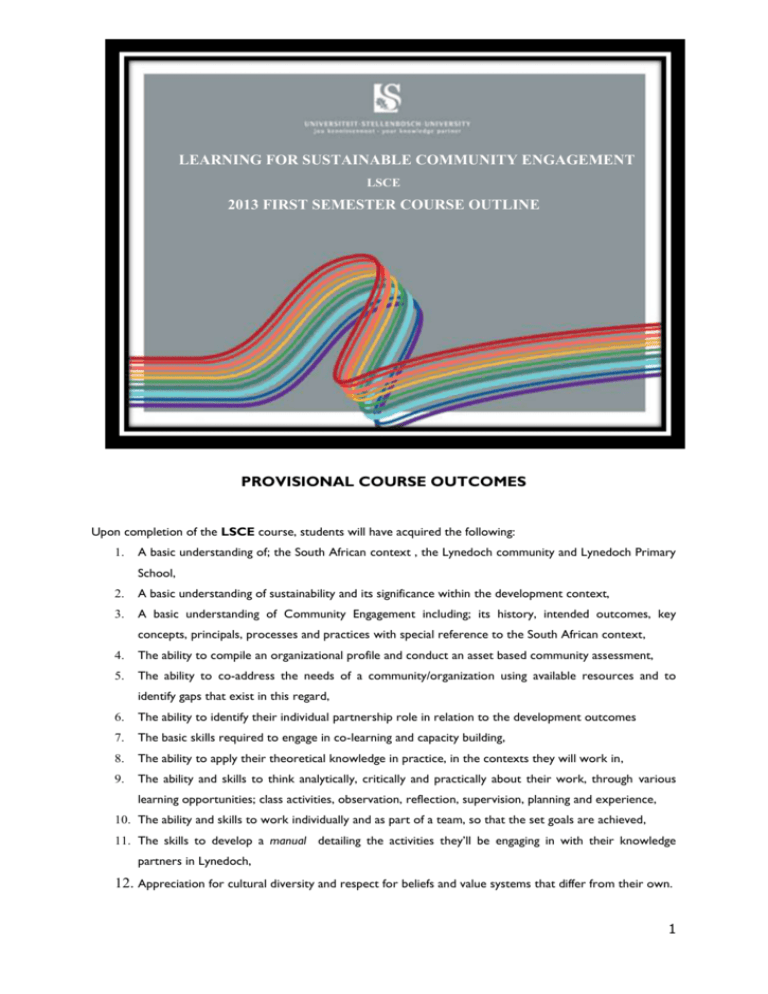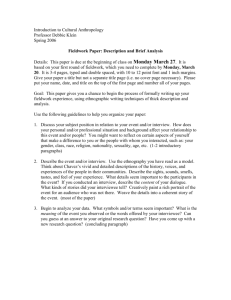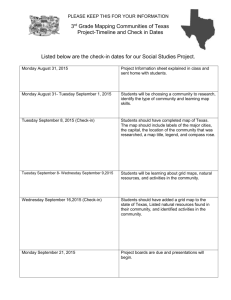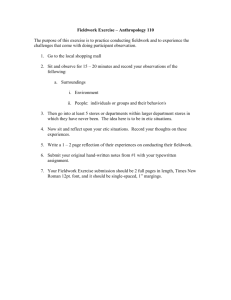PROGRAM SCHEDULE
advertisement

LEARNING FOR SUSTAINABLE COMMUNITY ENGAGEMENT LSCE 2013 FIRST SEMESTER COURSE OUTLINE PROVISIONAL COURSE OUTCOMES Upon completion of the LSCE course, students will have acquired the following: 1. A basic understanding of; the South African context , the Lynedoch community and Lynedoch Primary School, 2. A basic understanding of sustainability and its significance within the development context, 3. A basic understanding of Community Engagement including; its history, intended outcomes, key concepts, principals, processes and practices with special reference to the South African context, 4. The ability to compile an organizational profile and conduct an asset based community assessment, 5. The ability to co-address the needs of a community/organization using available resources and to identify gaps that exist in this regard, 6. The ability to identify their individual partnership role in relation to the development outcomes 7. The basic skills required to engage in co-learning and capacity building, 8. The ability to apply their theoretical knowledge in practice, in the contexts they will work in, 9. The ability and skills to think analytically, critically and practically about their work, through various learning opportunities; class activities, observation, reflection, supervision, planning and experience, 10. The ability and skills to work individually and as part of a team, so that the set goals are achieved, 11. The skills to develop a manual detailing the activities they’ll be engaging in with their knowledge partners in Lynedoch, 12. Appreciation for cultural diversity and respect for beliefs and value systems that differ from their own. 1 WEEKLY SCHEDULE o Students will attend lectures once a week, on a Friday from 9:00 to 16:00 in Lynedoch, at Lynedoch Primary School o They will work at Lynedoch Primary School every Monday from 9:00 to 13:30. o Muffins & tea/coffee will be served in the mornings o Warm meals & cool-drinks will be served at mid-day. PROGRAM SCHEDULE Date Seminar / Activity Monday Orientation 4th of February Welcome Appreciative Enquiry :1st Check-in Activity Interacting with the learners Basic Overview of the Course and logistical arrangements: travelling and meals Viewing video clips Grade Group Allocation Activities Proposal Presentation Organisational Profiling Presentation Question and answer session Lunch 1st Check-out activity Friday Check-in activity 8th of February ‘Golden Child Activity’ Working through the course outline Conducting an individual and group skills audit with the LSCE course participants Interviewing the school manager in order to compile a draft organisational profile First Meetings with the guardian educator/site supervisor Exchanging ideas for activities with the guardian educator/site supervisor Contracting Guidance preparing the first draft of an activities proposal Logistical and administrative issues Check-out activity Monday Fieldwork 11th of February Journaling Friday Check-in activity 15th of February What is LSCE? The Theoretical Underpinnings of Service Learning: Lesley Le Grange The Quest for Development: Robert Thornton and Mamphela Ramphele The Development Context (Prescribed Text) Chapter 1: Poverty, Ill-being & Wellbeing Chapter 2: The Development Environment Chapter 3: Stakeholders in Community Development Logistics Check-out activity Monday Fieldwork 18th of February Journaling Friday Check-in activity 22nd of February Ethics Skills For Community Development Chapter 10: Communication Skills Chapter 11: Group Facilitation & Leadership Chapter 12: Conflict Resolution, Mediation and Negotiation Chapter 4 : Understanding communities (F. Theron) Chapter 6 : Community Development and Community Organisations (F. Theron) Logistics Logistics Check-out activity Monday Fieldwork 25th of February Journaling Friday Check-in activity 2 1st of March Monday 4th of March Friday 8th of March Monday 11th of March Friday 15th of March Monday 18th of March Friday 22nd of March Monday 8th of April Friday 12th of April Monday 15th of April Friday 19th of April Monday 22nd of April Friday 26th of April Bio-ecological systems theory The Three C’s of Safe Schools: Johnson, Johnson, Stevahn and Hodne Logistics Check-out activity Fieldwork Journaling Check-in activity The Processes of Community Development Chapter 4: The Principles of Community Development Chapter 5: The Features and Outcomes of Community Development Group work Chapter 6: The Community as the Main Actor in Community Development Young People and Competent Community Builders :Finn and Checkoway Logistics and Check-out activity Fieldwork Journaling Check-in Tea-time Education Challenges and Visiting a community elder Lunch Check-out Reading Fieldwork Journaling Check-in activity The Processes of Community Development Chapter 7: The Place and Role of Community Development Workers Chapter 8: Community Development workers and their organisations Chapter 9: Participatory, Decision Making, Problem Solving and Management The dark side of shared decision making: Conway and Calzi Chapter 9 : Action Research (F. Theron) Logistics and Check-out activity First Take-home Test UNIVERSITY VACATION: 29 March - 7 April Fieldwork Journaling Check-in activity Community service learning and the South African research agenda: Mabel Erasmus Service-Learning in the Curriculum: A Resource for higher education Institutions: CJG Bender, P Daniels, J Lazerus, L Naude, and K. Sattar Poverty verses Poverties Sustainability Logistics and Check-out activity Fieldwork Journaling Check-in activity Presentations More Skills for Community Development Chapter 13: Mobilisation and Motivation Chapter 14: Operational Writing Chapter 15: Meeting Chapter 16: Public Speaking Logistics and Check-out activity Fieldwork Journaling Check-in activity The Life of a Project Chapter 17: Contact Making Chapter 18: Participatory Research Methodology 3 Monday 29th of April Friday 3rd of May Monday 6th of May Friday 10th of May Monday 13th of May Friday 17th of May CBPR: Railton Case-study Chapter 20: Planning and Implementation Chapter 21: Evaluation and Control Peer feedback Logistics Check-out activity Fieldwork Journaling Check-in activity Globalization Documentary Meeting/s Peer Feedback Logistics Check-out activity Fieldwork Journaling Check-in activity Preparation for termination Completion of all outstanding official documents Life beyond LSCE Logistics Check-out activity Termination from fieldwork Submit life beyond LSCE Summary Celebration of Work and Documentary Presentation MARK ALLOCATION (subject to change) Themed Journal Submissions and Field work Diary (10 entries) Assignment: Activity Proposals (Groups) 1st Activities Manuals (Individual Assignment) 2nd Assignment: Organizational Profile (Individual Assignment) 3rd Assignment: Application of Systems Theory (Individual and Group components) Take-Home Test: 3 Questions (2%+2%+4%) Leadership, Ethics, Key Concepts, Articles Power Point Presentations Portfolio of Evidence Life beyond LSCE Orals Evaluation of your Community Development Practice (2x3%) Test (2% +4%) Sustainability and Knowledge in the Blood Project Reports: (Project Proposal 3%, Project Evaluation Report; 3%) Documentary 24% 3% 3% 5% 15% 10% 10% 2% 2% 6% 6% 6% 8% CORE READINGS Books Knowledge in the Blood: Jonathan Jansen Community Development: Swannepoel and De Beer The Development Change Agent: Francois Theron Articles available as hard-copies Introduction: community service learning and the South African research agenda: Mabel Erasmus The ‘theoretical foundations’ of community service-learning: from taproots to rhizomes: Lesley Le Grange The Quest for Community: Robert Thorton and Mamphela Ramphele The Three C’s of Safe Schools: Johnson, Johnson, Stevahn and Hodne Young People and Competent Community Builders :Finn and Checkoway The dark side of shared decision making: Conway and Calzi Ecological Models of human Development: Urie Bronfenbrenner Additional Articles available electronically 4 JOURNAL THEMES: 1st Journal Theme Having spent the morning with your community engagement partners, articulate and briefly discuss your first impressions, highlighting what you think the implications of these may be. Your journal entry must be approximately 200 - 220 words. You may not exceed the prescribed limit. 2nd Journal Theme Within the community development context, it is very important to be mindful of the power differentials that exist between stakeholders. Based on the articles you’ve read and the discussions in class, write a paragraph of approximately 200 - 220 words in which you reflect on how this may manifest within the context you’ll be working. 3rd Journal Theme Respectful relationships provide the foundation for effective community engagement. Write a paragraph of approximately 200 - 220 words in which you comment on this dynamic within your small group, yourself and the community agency you’ve partnered with and the group you working with. 4th Journal Theme The community must be the main actor in community development initiatives. Write a paragraph of approximately 200 - 220 words in which you comment on this principle within the community development context that you are working. 5th Journal Theme In class much attention was devoted to barriers to community development initiatives. Write a paragraph of approximately 200 - 220 words in which you reflect on your experiences regarding this topic. 6th Journal Theme Reciprocity is a about bi-directional exchanges. Write a paragraph of approximately 200 - 220 words commenting on how this dynamic is playing out in your community engagement work. 7th Journal Theme Based on what you’ve learnt about Poverty/Poverties, write a paragraph of approximately 200 - 220 words in which you reflect on these practice as it pertains to your community engagement work. 8th Journal Theme The interpersonal dynamics within the small groups impacts significantly on the dynamics within the grade groups; Write a paragraph of approximately 200 - 220 words, focussing on the theme of “Group Dynamics.” 9th Journal Theme The dialectical process of learning, doing and reflecting is a central component of service learning. Write a paragraph of approximately 200 - 220 words reflecting on how what you’ve learnt and done in class over the past 4 days has impacted you. 10th Journal Theme In community development enabling empowerment is about creating awareness and hope. Write a paragraph of approximately 200 - 220 words in which you reflect on the extent to which this has been achieved by you and your group. GROUP ASSIGNMENT Analyse and discuss the ‘community’ in which your fieldwork is located using Urie Bronfenbrenner’s Bioecological System’s Theory TRANSPORT The PGIO will provide Taxis for the first 2 weeks, thereafter students will travel by train. STATIONARY Students need to purchase the following: 5 1 Big box of colouring pencils 1 File for the portfolio 1 packet of A4 size black paper PHOTOCOPIES REQUIRED FOR FIELDWORK These must be submitted to Brandon Hiemand at lsce@sun.ac.za a week in advance. N.B. Marks are issued by Stellenbosch University upon completion of course. Students may discuss their progress with the lecturer as the program unfolds. 6




